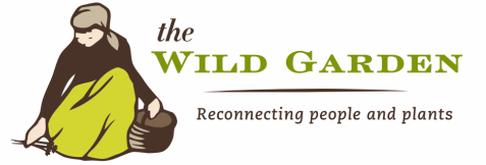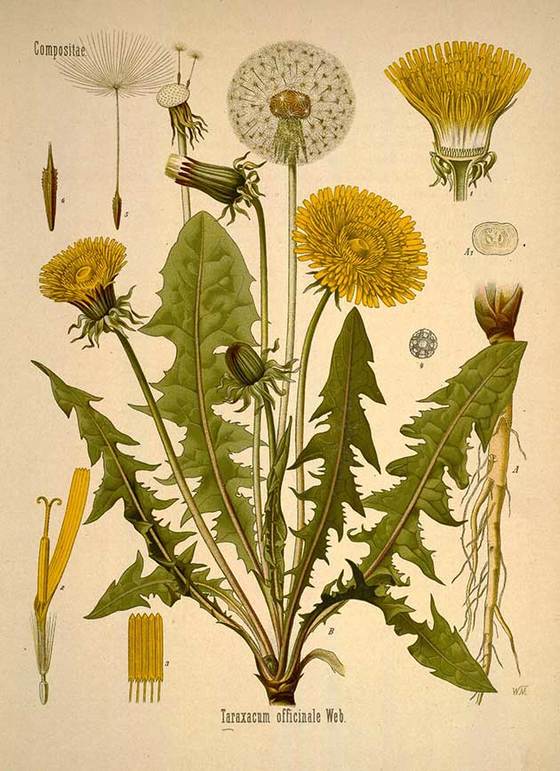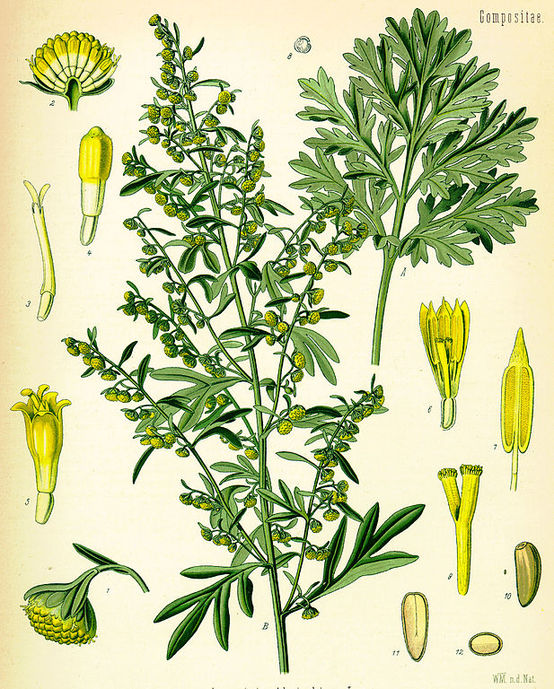The Language of Plants Series- The Bitter Box
“A plant's scent is its language. Its colour communicates. In its flavour it speaks to us; not in our language, but in its.” ~jim mcdonald
"Bitter foods are what everyone absolutely everywhere should work into their diet. Nowhere on the planet was there ever a group of people that existed, that was eating a diet relative to the place that they lived in, that wouldn’t have been eating a lot of btter greens. Bitter greens would have just been an important part of every traditional diet no matter what." ~jim mcdonald
Bitterness is one of the most wide-spread tastes found in our plant medicines and I think it's no coincidence that the receptors for the bitters taste in our bodies are the most complex of all our taste receptors. Yet it is also one of the flavours that many of us rarely experience with a standard North American diet.
September's box will delve into the bitter taste and the benefits of adding more of it to the diet. We will look at all the amazing things that happen to the digestive tract and other systems when we taste something bitter. In the newsletter read about Bitter Deficiency Syndrome and its symptoms, the cooling & drying energetics of bitter. and how bitters can help balance the body.
Herbs you may meet include dandelion, blue vervain, goldenrod, yarrow, wormwood, alder, black walnut, elecampane, and/or hops. Products you may find include a tea, an electuary, a relaxing nervine, a warmning bitter, a cooling bitter, an infused vinegar or a glycerite.
"It is my opinion that the nearly complete lack of bitter flavored foods in the overall U.S. and Canadian diet is a major contributing factor to common cultural health imbalances such as PMS, other female and male sexual organ dysfunctions, hormonal imbalances, migraine headache, indigestion, liver and gall bladder dysfunction, abnormal metabolism, hypoglycemia, diabetes, etc." ~James Green, The Male Herbal
"Bitter foods are what everyone absolutely everywhere should work into their diet. Nowhere on the planet was there ever a group of people that existed, that was eating a diet relative to the place that they lived in, that wouldn’t have been eating a lot of btter greens. Bitter greens would have just been an important part of every traditional diet no matter what." ~jim mcdonald
Bitterness is one of the most wide-spread tastes found in our plant medicines and I think it's no coincidence that the receptors for the bitters taste in our bodies are the most complex of all our taste receptors. Yet it is also one of the flavours that many of us rarely experience with a standard North American diet.
September's box will delve into the bitter taste and the benefits of adding more of it to the diet. We will look at all the amazing things that happen to the digestive tract and other systems when we taste something bitter. In the newsletter read about Bitter Deficiency Syndrome and its symptoms, the cooling & drying energetics of bitter. and how bitters can help balance the body.
Herbs you may meet include dandelion, blue vervain, goldenrod, yarrow, wormwood, alder, black walnut, elecampane, and/or hops. Products you may find include a tea, an electuary, a relaxing nervine, a warmning bitter, a cooling bitter, an infused vinegar or a glycerite.
"It is my opinion that the nearly complete lack of bitter flavored foods in the overall U.S. and Canadian diet is a major contributing factor to common cultural health imbalances such as PMS, other female and male sexual organ dysfunctions, hormonal imbalances, migraine headache, indigestion, liver and gall bladder dysfunction, abnormal metabolism, hypoglycemia, diabetes, etc." ~James Green, The Male Herbal
“Energetics and actions are not lists of correspondences and memorizable terms, but rather a mode of perception through our senses. A way of listening to the language of the plants with our bodies.” ~Kiva Rose
In the slippery mucilage of a violet leaf, the bitter bite of dandelion or the sour burst of wood sorrel, plants speak to us. Their volatile oils, glycosides, alkaloids and resins inscribe an ancient wisdom upon our tongues. We learn the language of plants when we listen to these chemical messengers and feel their effects in our bodies. Understanding the flavours and impressions of herbs through our senses deepens our knowledge of their therapeutic actions in the body and we become more connected, effective plant healers.
Over the next few months the herbal boxes will explore the actions and properties of the tastes found in herbs.
June: Salty
July: Sour & Astringent
August: Sweet & Demulcent
September: Bitter
October: Pungent & Spicy .
With each month's box discover awareness practices for connecting with and training your senses. Learn about various classes of chemical constituents found in the plants and how they interact with our tissues, organs and systems of the body. Immerse yourself in an experiential, organoleptic relationship with the plants. Listen to the language of the plants with your body.
"As in ancient times, herbalists would do well to continue to rely upon their trained senses and experience to properly assess the therapeutic nature of plants, and among the different faculties there is perhaps no equal to the perception of taste. Used by every system of traditional medicine, taste figures prominently in the practice of herbal medicine, providing immediate insight into the properties and uses of medicinal plants.” ~Todd Caldecott, Ayurveda Herbalist
In the slippery mucilage of a violet leaf, the bitter bite of dandelion or the sour burst of wood sorrel, plants speak to us. Their volatile oils, glycosides, alkaloids and resins inscribe an ancient wisdom upon our tongues. We learn the language of plants when we listen to these chemical messengers and feel their effects in our bodies. Understanding the flavours and impressions of herbs through our senses deepens our knowledge of their therapeutic actions in the body and we become more connected, effective plant healers.
Over the next few months the herbal boxes will explore the actions and properties of the tastes found in herbs.
June: Salty
July: Sour & Astringent
August: Sweet & Demulcent
September: Bitter
October: Pungent & Spicy .
With each month's box discover awareness practices for connecting with and training your senses. Learn about various classes of chemical constituents found in the plants and how they interact with our tissues, organs and systems of the body. Immerse yourself in an experiential, organoleptic relationship with the plants. Listen to the language of the plants with your body.
"As in ancient times, herbalists would do well to continue to rely upon their trained senses and experience to properly assess the therapeutic nature of plants, and among the different faculties there is perhaps no equal to the perception of taste. Used by every system of traditional medicine, taste figures prominently in the practice of herbal medicine, providing immediate insight into the properties and uses of medicinal plants.” ~Todd Caldecott, Ayurveda Herbalist
Boxes are offered with sliding scale prices. To learn more about sliding scale pricing, please read this post. But basically, in a nut shell (pun intended!), I invite you to pay one of the reduced fees, if paying the full price would cause you to be less secure in your ability to meet your food, health, housing or essential transport needs. To determine where you fall on the scale when choosing which price to pay, please refer to this infographic created by Alexis J. Cunningfolk (Click image to enlarge).
Please note: As of April 1st, HST will be charged on all products.
Please note: As of April 1st, HST will be charged on all products.
Large Box- 6 products
|
Small Box- 4 products
|
Please note that I can no longer ship to the US.
Payments can also be made by cheque made out to:
The Wild Garden, 2389 Pepin Ct. Ottawa, ON, K1B 4Z3
Additional shipping fees may apply outside of Ontario and Western Quebec.
Please contact me for more information: info at thewildgarden dot ca
About the Herbal Box
The Wild Garden Herbal Box is your opportunity to connect with and learn about the wild edible and healing plants of the Ottawa bioregion. Monthly boxes are delivered directly to your door. Each month’s box will explore a particular theme and comes with a detailed newsletter highlighting the products for the month and is full of information, historical lore, recipes and more! Herbal boxes make great gifts and can be shipped directly to the recipient.
Monthly subscribers also enjoy free access to any walks and select workshops offered by the Wild Garden, during the month(s) for which they are subscribed. (Material fees apply and pre-registration is required.)
With an herbal box you can:
Payments can also be made by cheque made out to:
The Wild Garden, 2389 Pepin Ct. Ottawa, ON, K1B 4Z3
Additional shipping fees may apply outside of Ontario and Western Quebec.
Please contact me for more information: info at thewildgarden dot ca
About the Herbal Box
The Wild Garden Herbal Box is your opportunity to connect with and learn about the wild edible and healing plants of the Ottawa bioregion. Monthly boxes are delivered directly to your door. Each month’s box will explore a particular theme and comes with a detailed newsletter highlighting the products for the month and is full of information, historical lore, recipes and more! Herbal boxes make great gifts and can be shipped directly to the recipient.
Monthly subscribers also enjoy free access to any walks and select workshops offered by the Wild Garden, during the month(s) for which they are subscribed. (Material fees apply and pre-registration is required.)
With an herbal box you can:
- build your own home apothecary of healing plants and discover traditional ways of supporting wellness
- support local, small-scale, organic permaculture
- incorporate more nutrient dense wild foods into your diet
- enjoy organically grown and ethically wild gathered foods and herbs delivered directly to your door (all products are made from herbs that I grow and gather myself on the Just Food Food Farm.)
- nourish yourself and your family with local, seasonal products handcrafted with love in small batches
- learn about the wild plants growing in the greater Ottawa bioregion
- loose-leaf tea blend
- herb infused honey
- herb infused vinegar
- herbal syrup or elixir
- wild herb seasoning blend, dried culinary herbs
- wild food preserve (jam, jelly, fruit leather…)
- herbal liqueur
- tincture
- herbal salve
- body oil, body butter or lotion bar
- herbal scrub or bath salt
- loose incense and smudges



